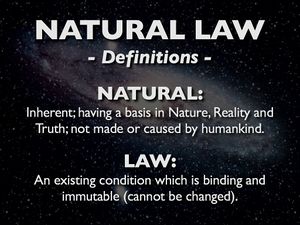Template:Right: Difference between revisions
No edit summary |
|||
| Line 1: | Line 1: | ||
== Right and Responsibility == | == Right and Responsibility == | ||
Rights are responsibilities because the word "right" or "rights" as a noun is defined as '''"that which is [[morality|morally correct]], just, or honorable"''' and responsibility can be defined as what is expected or a thing that one is required to do to be '''[[morality|morally correct]], just, or honorable"''' | Rights are responsibilities because the word "right" or "rights" as a noun is defined as '''"that which is [[morality|morally correct]], just, or honorable"''' and responsibility can be defined as what is expected or a thing that one is required to do to be '''[[morality|morally correct]], just, or honorable".''' | ||
Taking back rights or just maintaining free access to natural rights requires every individual to exercise their responsibilities for themselves, to their community, and by their cooperation with society with the same diligence and enthusiasm as they have for the enjoyment of their rights. | |||
[[File:naturallaw.jpg|right|300px|thumb|[[Natural law]] is the law that all legal system must exist within. In that Law of Nature and Nature's God man is endowed with the right to [[choose]].]] | [[File:naturallaw.jpg|right|300px|thumb|[[Natural law]] is the law that all legal system must exist within. In that Law of Nature and Nature's God man is endowed with the right to [[choose]].]] | ||
Revision as of 13:35, 8 January 2023
Right and Responsibility
Rights are responsibilities because the word "right" or "rights" as a noun is defined as "that which is morally correct, just, or honorable" and responsibility can be defined as what is expected or a thing that one is required to do to be morally correct, just, or honorable".
Taking back rights or just maintaining free access to natural rights requires every individual to exercise their responsibilities for themselves, to their community, and by their cooperation with society with the same diligence and enthusiasm as they have for the enjoyment of their rights.

Some listed rights
- Right to self-determination
- Right to your labor and what it produces
- Right to procreate
- Right to choose or liberty of choice
- Right to due process of natural law
- Right to freedom of movement
- Right to freedom of thought
- Right to freedom of conscience and religion
- Right to freedom of expression
- Right to peacefully assemble
- Right to freedom of association
- “Civil rights are such as belong to every citizen of the state or country, or, in a wider sense to all its inhabitants, and are not connected with the organization or the administration of government. They include the rights of property, marriage, protection by laws, freedom of contract, trial by jury, etc.” [1]
Natural rights are a thing of nature and therefore are inherited through nature from generation to generation. Slavery or bondage is also inherited. Man may be endowed by his Creator with certain rights but his pro-creators may undermine his access to those natural rights before you are even conceived.
Having a right is not the same thing as enjoying a right. There are many things in a hostile world that would deprive the individual of the enjoyment of your natural rights. If you will not pursue your responsibilities you will soon not enjoy your rights because every right has a correlative responsibility that gives it life, purpose, and meaning.
Many like Abraham, Moses, Samuel, Polybius, Plutarch, Peter and Paul contemplated the road to or from freedom, they warned us what could bring liberty and what would destroy it. If we had an appetite for the wages of unrighteousness we would be entangled in the yoke of bondage to the point of becoming merchandise and cursing our children. Christ and John the Baptist gave us the key to liberty under God but the Modern Christian who regularly engage in covetous practices seems opposed to the practices of the early Church.
To maintain your rights you must care about your neighbor's rights, life, and liberty as much as your own. That God-given responsibility to your fellow man is what is considered in Natural Law to be "morally correct, just, or honorable". That is the practice of Pure Religion unspotted by the world which is seen in the foundation of The Ten Laws of ancient Israel and other laws such as the Law of the Maat.
Natural Law and legal rights are two types of rights: legal rights are those bestowed onto a person by a given legal system usually as a result of contracts within a Social contract, while natural rights are those not contingent upon the laws, customs, or beliefs of any particular culture or government, and therefore universal and inalienable. They are inherent and considered endowed by Nature and Nature's God, the God of creation rather than the gods many spoke of by the apostle Paul.
- "In the end, more than freedom, they wanted security. They wanted a comfortable life, and they lost it all — security, comfort, and freedom. When the Athenians finally wanted not to give to society but for society to give to them, when the freedom they wished for most was freedom from responsibility then Athens ceased to be free and was never free again. " — Sir Edward Gibbon (1737-1794), author of The Decline and Fall of the Roman Empire, wrote tellingly of the collapse of Athens, On ancient Athens.
The theory of Natural Law is closely related to the theory of natural rights. During the Age of Enlightenment, Natural Law theory challenged the divine right of kings, and became an alternative justification for the establishment of a Social contract, positive law, and government.

"Freedom is the Right to Choose, the Right to create for oneself the alternatives of Choice. Without the possibility of Choice, and the exercise of Choice, a man is not a man but a member, an instrument, a thing.” Archibald MacLeish
Redistribution of that which is produced by the sweat, blood, and life of the individual through force rather than the choice of charity diminishes freedom and degenerates the souls of men.
Ultimately if you want your rights back you must take back your responsibilities to your fellow man which brings us to the definition of Religion two hundred years ago when all social welfare was by charity as required by Christ and not by the rule of force like Caesar, Pharaoh, Nimrod or Cain.
- ↑ Right. In Constitutional Law. Black’s 3rd p. 1559.